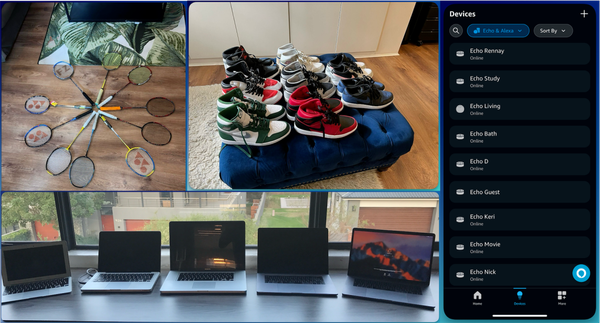Vodacom/VodaPay Mini Program - Part 1: First Impressions
Vodacom have finally unveiled their VodaPay Mini Program which promises opportunities for Developers. This is the first in a series of posts detailing my experience with the platform.
Last week, Vodacom officially launched their VodaPay Mini Program platform - see press release. Since the announcement of the Vodacom-AliPay partnership in 2020, I've been especially keen to see what the offering would look like. I was hooked from the moment I saw "Opportunities for developers" and immediately went searching for more information. I have documented my experience to help others who might also be interested in this platform.
Observation #1: Incorrect Link
The link from the press release and news sites directs to vodapay.vodacom.co.za. The landing page loads great - but trying to click any of the links resulted in a dead end. Fair enough, I thought - they're still setting up their Developer Portal - lets give them some time. After a few hours (probably more like several minutes), I grew impatient and start trolling through LinkedIn to see if I could find an existing/new contact to get more information. Finally scanned a post and found a LinkedIn link which directed to developer.vodapay.vodacom.co.za. The links from this site worked! Lesson - be sure to check and double check links before they go out.
Observation #2: Application Model
TL;DR - Vodacom is adopting the Mini Program model from mega-successful apps like WeChat and AliPay in China. It is essentially a "scaled down App within a container App" ecosystem. Sounds awesome! Interesting to see how Apple feels about this approach - but I suppose mega-players like WeChat, AliPay and Vodafone have the clout to make it stick.
Did some research and came across some good primers:
Although the above are WeChat specific, the concept applies to VodaPay's Mini Program.
Observation #3: VodaPay/AliPay Link
It appears that the AliPay platform has been "ported" for Vodacom's use, under the banner of VodaPay. I get this impression from reading through some of the documentation - the grammar appears to be rough translation to English at times and it also comes in later sections of the portal.
When you click through the portal, you might catch that some of the content is actually coming from ...alipay.com. This is indeed both a blessing and a curse for Vodacom. The benefit is that they've hit the ground running with an established platform which has a large global footprint. The drawback is that customisation is going to be a challenge. Really looking forward to seeing how other Telcos and organizations respond to this salvo.
I am especially keen to see the "container application" VodaPay rolls out. For AliPay, the container is the "AliPay" App. This would require massive customisation and localisation for the South African market.
Observation #4: Benefits
The benefits I see from this initiative are:
- Easy to develop - in comparison to mobile applications, its a breeze.
- Quick time to market - the application you build will be "hosted", no need to worry about deployment or web hosting. I would think that a focused developer can get an App to market within 3-5 days, from inception to implementation.
- User base - Vodacom have 43+ million customers. Even if a fraction of customers downloads the container app, your Mini Program has a "ready audience". Also - appears to be fairly simple for users to "share" links to Mini Programs.
- Accessibility to platform services - The base product which Vodacom/VodaPay is building this for is, in my opinion, a Mobile Wallet - much like the m-Pesa solution, that is wildly popular in East Africa. Another great "platform service" is user identity (and implicit authentication). By taking care of these underlying services, allows developers to focus on content.
- Tried and trusted model - this appears to be quite successful for WeChat and AliPay in China. Hoping it achieves similar success in South Africa, possibly also the rest of Africa.
- Zero Rated Data Usage - Vodacom customers using Mini Programs will not incur any data costs. This is massive! One of the reasons USSD is so popular is because it is free. Imagine customers being able to use a service or play a game at no cost!
- It's code! - Did I mention "Opportunities for Developers"? High time that organizations in South Africa start working with developers to get new and innovative solutions out.
Observation #5: Potential
From my research, specifically WeChat Mini Programs E-commerce White Paper, there are 2.3M Mini Programs, with 350M Daily Active Users with use from 63% of WeChat users. Even if we scale those numbers from China to South Africa, those figures certainly are impressive.
If this approach does penetrate through to all segments of the market, as I hope it will (VodaPay Super App will most likely be pre-installed on all devices sold by Vodacom), it has the potential to make a massive impact. With that being said, there is a significant amount that Vodacom/VodaPay still needs to do to build and maintain the Mini Program ecosystem.
I am extremely optimistic about the Mini Program approach and consider it a massive opportunity for developers in South Africa. I've set a Mini Goal (pun intended) to get an application up and running. In future posts, I will cover other aspects - such as "Sign Up", "Development" and "Deployment". If you enjoyed this post and want to be informed of new ones, be sure to Subscribe. Also - please drop me a note if you have any thoughts or suggestions or areas you would like to cover.



